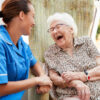Last month, Secure Aging shared with our readers some facts about Parkinson’s disease. Parkinson’s is a chronic, neurological disease that affects the nervous system and body movement; about 1 million people in the U.S. have Parkinson’s disease.
This month, we share some caregiving tips for those with loved ones who have Parkinson’s disease.
- Get informed. If you are caring for someone newly diagnosed with Parkinson’s disease, find out for yourself some basic facts about it—what it is, how it’s typically treated, and symptoms. It’s best to start with a trusted doctor who can fill you in and who can also recommend online sources you can review. You can also find reliable information on the National Institute on Aging website and on the Parkinson’s Foundation website.
- Find out what’s normal—and when to seek additional help. The course for Parkinson’s can be different for everyone, so ask your loved one’s doctor what symptoms are normal and which ones require reaching additional health expertise.
- Organize any medications. Your loved one will likely have to use several types of medications. The best way to make sure they take what they need is with some good organization. The following article from Caregiver.com has some solid tips that encourage better medication organization, including keeping a list of medications used and sharing that list with other family members. The article also shares several other good tips for caring with someone who has Parkinson’s.
- Seek care that can improve quality of life. This can include physical therapy, occupational therapy, diet management, regular exercise, and care available through other local programs geared toward those with Parkinson’s disease. Parkinson Place in Sarasota is one organization that can help with Parkinson’s care. Certain health providers also may be trained in programs geared toward those with Parkinson’s. For instance, On the Go Therapy, profiled recently on our Secure Aging website, has staff members trained in the LSVT Big program for Parkinson’s disease.
- Don’t forget self-care. Caregivers are often so involved in caring for others that they neglect good care for themselves. Don’t forget to get adequate sleep, eat well, and take some time for yourself every day. Watch out for signs of depression (in yourself or your loved one with Parkinson’s), and reach out for help if you are overwhelmed. Secure Aging can assist with care management so caregivers can get a break.
Call Secure Aging to Find Out How We Can Help Seniors With Care Management
At Secure Aging in Bradenton, we transform the weight of the world into a sigh of relief for our senior clients and their concerned family members. The mission of Secure Aging is to protect and preserve our client’s independence and dignity through careful and thoughtful financial and care management. As our clients' age, it is their desire to remain independent and age with dignity. Our services protect our clients from talented con artists looking to exploit and deplete the financial resources of our vulnerable seniors. Secure Aging helps families in Manatee County and Sarasota County and in and around the communities of Anna Maria, Bradenton, Bradenton Beach, Ellenton, Holmes Beach, Lakewood Ranch, Longboat Key, Myakka City, Palmetto, Parrish, and Sarasota. Call us at 941-761-9338, or visit us online at www.secureaging.com.
















